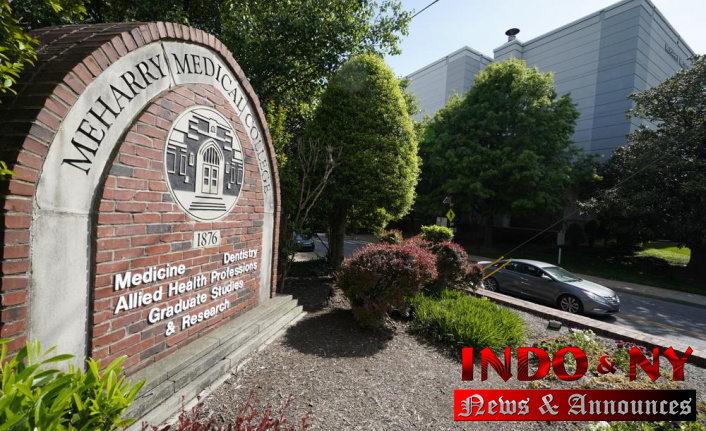Thursday's announcement by a coalition of four historically Black colleges and universities was a new initiative that aims to increase the number of organ donors in America and reduce disparities among transplant recipients.
This collaboration comes after a National Academies of Sciences, Engineering and Medicine (Realizing The Promise of Equity in Organ Transplantation System) report that revealed significant inequalities in the country's organ transplantation system. The report was published earlier in the year by Congress. It was commissioned to study equity in organ transplantation, allocation, and distribution.
Consortium of HBCU Medical Schools and the Organ Donation Advocacy Group created the initiative. It will provide new opportunities for Black medical students and nurses to shadow transplant centers and organ procurement organizations, and work with partner HBCUs offering programs in nursing, public policy, and health care administration. The Associated Press was first to hear about the initiative.
The Charles R. Drew University of Medicine and Sciences is in Los Angeles, Howard University College of Medicine and Washington, Meharry College in Nashville, Tennessee and the Morehouse School of Medicine and Medicine in Atlanta are all part of the HBCU consortium.
Health professionals will speak to students in K-12 schools about their career options and the field. The initiative will also be focused on community education. This includes creating materials for transplantation patients and hosting blood drives and health fairs.
Americans have been concerned for decades about the equitable access to organ transplants. However, attention has risen in recent years following the global COVID-19 pandemic which took a devastating toll on Black Americans. It exposed the long-standing health inequalities in the country's healthcare system and revealed structural racism and unequal access to care.
Dr. James E.K. stated that "at the heart of all this, the profound disparity between transplants that are given to African Americans and those performed on whites in the country, and it’s a long-standing issue and problem." In an interview with The Associated Press, Hildreth, president of Meharry Medical College and CEO, was candid.
Hildreth stated that some of this messaging must come from trusted organizations. Hildreth added that another reason that Hildreth believes that the four Black medical schools play a very important part that could not be fulfilled by any other organization in the country was because they are trustworthy.
The HBCU medical schools have been a vital pipeline for Black doctors and other professionals in the medical field. Hildreth stated that the initiative will increase these numbers. To address the issue of health equity in light of the pandemic, the HBCU Medical Schools Collaborative was created in 2020. Hildreth stated that the schools share a history of working together on disparities areas that have been overlooked by the medical and health system historically.
However, the HBCU collaboration has grown and they have identified kidney donations and transplants as an area of concern. This is because Black nephrologists (doctors who diagnose and treat chronic and acute kidney problems) account for less than 7% and only 5.5% respectively of the transplant surgeons.
Hildreth stated that about 80% of Meharry graduate go on to work for underserved communities. 85% of them are Black. They come from lower-income households than the average white medical student.
Dr. Clive Callender is a Howard University College of Medicine transplant surgeon who is known for being a pioneer in organ donation equity. This collaboration will save thousands of lives by strengthening relationships between healthcare workers, Black and minority patients, and transplantation professionals.
According to the Department of Health and Human Services Office of Minority Health, Black Americans are the most vulnerable group of people of color in America who need organ transplants. According to the National Institute of Diabetes and Digestive and Kidney Diseases, Black Americans are nearly four times more likely to experience kidney failure than white Americans.
While Black Americans account for 13% of the U.S. populace, 35% of those with kidney disease, or the majority of transplants, are from Black America. The National Academies of Sciences, Engineering and Medicine (or NASEM) report established a baseline to increase organ transplants to 50,000 per year by 2026. 41,354 transplants took place in 2021, an increase of 5.9% compared to 2020.
While 28.5% are Black Americans currently waiting for transplants, 12.9% of all organ donors were Black Americans in 2020. While the total number of White Americans currently on transplant waiting lists for organs is approximately 1.4 times higher than that of Black Americans, the number of applicants waiting for a transplant is nearly equal between these two groups.
"There's a lot of urgency by the time they get on to the list. Hildreth spoke out about Black candidates, pointing out that many don't make it to receive a transplant due to the long waits.
Last year's annual transplant records included 24,669 kidney transplants (9,236 liver transplants) and 3,817 heart transplants. Out of the 57 national organ procurement agencies, 49 saw an increase in transplants over 2020 and 45 set all time records for donor recovery in a single year.
However, there are still disparities.
Jill Grandas is the executive director of DCI Donor Services. This organ procurement agency serves California, Tennessee, New Mexico, and New Mexico. DCI will work with the HBCUs in the communities and within the health sector to increase awareness about organ donation and transplants. Her team is faced with mistrust from Black Americans and other members of the community, which she believes stems from a lack of trust in the health system. This has caused harm to their families and communities.
Grandas stated that there are not enough industry leaders who work to remove "barriers to trust" through education or direct programming. Grandas also said that organ procurement and transplant centers must be held accountable to ensure there aren't any disparities.
Grandas stated, "Equity must be addressed."
Renee Landers was the former deputy general counsel at HHS and was part of the NASEM authoring committee. She said that she hopes that the initiative will spur more action not only to address donor and transplantation disparities, but also other health issues.
Landers, who is a Suffolk University Law School faculty director for health and biomedical legal at the Boston Law School, said that it was important to place a particular emphasis on encouraging and building people of color into the healthcare professions as doctors and other caregivers. "And Black medical schools could play a very significant role in this."











